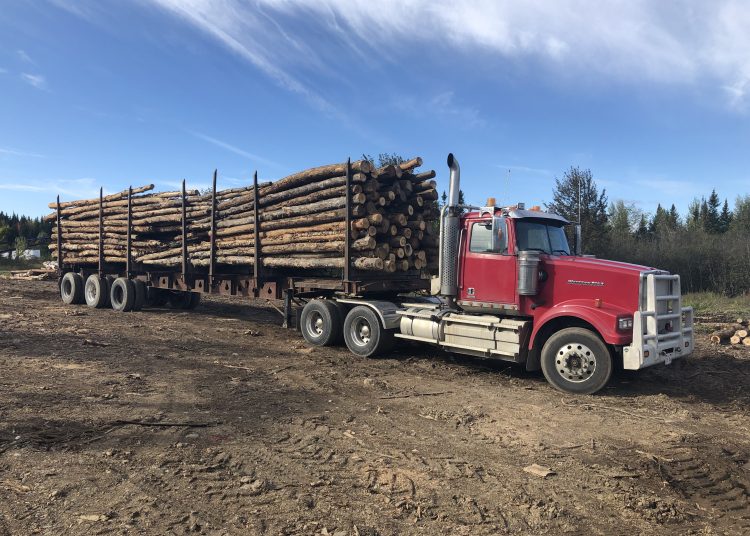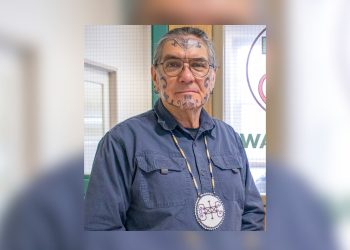A lifelong Woodstock wood producer wants Indigenous loggers in New Brunswick to be able to earn a livelihood, but says the way Crown forest is managed in the province stops them.
For 50 years, Dick Poulin managed the Garant sawmill in the northwest New Brunswick town of Woodstock. The sawmill, specializing in value-added hardwood products, employs 30 local people.
Today, the semi-retired Poulin operates a log yard that buys, processes and sells hardwood logs.
Poulin is frustrated by the Crown lands licensing system that stops his business from purchasing timber from the Indigenous loggers. The government refuses to allow such transactions because of restrictions imposed by New Brunswick’s Crown Lands and Forests Act.
Right now, Indigenous loggers can only sell their wood to Crown license holders or sub-license holders. They can’t sell their wood to private mills.
According to Poulin, Indigenous people in New Brunswick are only allowed to cut a minuscule portion of Crown Land.
Crown land, like other land in New Brunswick, has never been surrendered by Indigenous peoples and is subject to the Peace and Friendship Treaties signed between the British Crown and the Indigenous peoples of the region in the 1700s.
Crown forest in the province of New Brunswick, about half of the province’s land mass, is divided up into six Crown licenses.
J.D. Irving, AV Cell, AV Nackawic, Twin Rivers and Fornebu Lumber hold five of the 25-year timber licenses, which allow them management responsibility and rights to cut a certain amount of wood every year. The government has been managing the sixth license since Weyerhaeuser abandoned the license and closed its mill in Miramichi in 2007.
Crown lands in New Brunswick under the management of a handful of huge forestry companies is a recent development.
In 1982, the Hatfield PC government consolidated 84 Crown licenses into ten licenses and tied those licenses to an operating mill. At the turn of the millennium, the Crown licenses were reduced again to six.
After years of intense lobbying, in 2014, the David Alward PC government gave three of the most powerful players in New Brunswick’s forestry industry its wish: a signed contract committing the province to guaranteeing three large forestry players, J.D. Irving, AV Nackawic and Twin Rivers, an increased annual allowable cut from Crown forest.
Critics of the forestry strategy, including conservation groups, First Nations, municipalities, woodlot owners, smaller mill owners, wildlife biologists and academics, voiced their opposition to granting the forestry companies an increased softwood fibre supply. They argued that the forestry contracts would mean cutting wood from lands set aside for conservation and would put the province’s already struggling woodlot owners at a further market disadvantage. The contracts also shut out others wanting to pilot community forestry and Indigenous loggers wanting to earn a livelihood.
In 2019, the province of New Brunswick used the Crown Lands and Forests Act to fine two Wolastoqey men with harvesting timber illegally. In response, six Wolastoqey Nations recently launched a court challenge to affirm the treaty right of their members to access resources to earn a moderate livelihood: a treaty right affirmed when Mi’kmaq fisherman Donald Marshall Jr. went to the Supreme Court of Canada in 1999.
According to Woodstock Chief Tim Paul, “We have a Treaty Right to harvest Crown timber for the purposes of sale as firewood in order to earn a ‘moderate livelihood,’ but the province continues to blatantly ignore our rights and our members continue to be harassed by the Province. The province cannot continue to deny us our rights.”
In 1997, prior to the 1999 Marshall decision, a provincial court ruled that Wolastoq logger Reginald Paul and the Wolastoqey and Mi’kmaq peoples of New Brunswick have a treaty right to harvest timber from Crown land.
The Paul case was later overturned in an appeal court, but the court case did push the provincial government to provide limited harvesting rights to First Nations through First Nation Harvesting Agreements. However, First Nations do not get to decide the volume and the location of timber to be harvested as well as the price of timber and revenue to be generated from a timber harvest in such arrangements.
Stephen Wyatt, a professor at Université de Moncton’s School of Forestry, and colleagues surveyed 13 of the 15 First Nations communities in New Brunswick in 2015. They found that the First Nations felt that forestry governance arrangements were not delivering on their priorities for environmental protection. They also thought the power in these arrangements resides with government and industry.
“We believe the Indigenous loggers need a chance. We should be allowed to purchase logs from them and create jobs in small communities across the province,” says Poulin.
Forest ecologist and woods craftsman Lawrence Wuest agrees with Poulin. Wuest has long called on the province of New Brunswick to support a value-added forestry industry.
According to Wuest, “One of the major ways that other jurisdictions outperform New Brunswick with respect to turning the forest resource into jobs is their ability to route timber to secondary processing within the jurisdiction, and in their ability to promote use of local timber domestically.”
“The province has a wooden ear when it comes to hearing these messages,” says Wuest.
Tracy Glynn is a doctoral researcher with RAVEN and was the forest campaigner with the Conservation Council of New Brunswick from 2006 to 2018.









![Is pollution from industry causing the neurological disease ALS in New Brunswick? [video]](https://nbmediacoop.org/wp-content/uploads/2025/10/Quintin-Soloviev-Belledune_Generating_Station_in_New_Brunswick_Canada-120x86.jpg)
